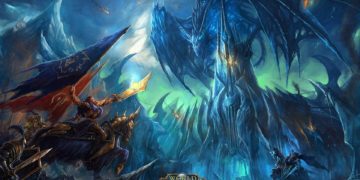Andrew Maximov has spent 12 years in the video game industry. Despite his extensive experience, he remains amazed by the high costs of developing major games.
“I used to work for PlayStation and the last game that I worked on, just production alone cost us $220 [£176m], and then you double that for marketing, and you are in half a billion dollars for every game that you put out there, which is a bit unsustainable for most companies.”
He thinks that artificial intelligence (AI) will be important in reducing the high costs of making games. AI can also save game designers a lot of time by handling routine tasks automatically.
His business, Promethean AI, provides developers with tools to create their own digital environments. Mr. Maximov aims to change the current methods of game production.
“What we’re trying to do is replace that with a system that can learn directly from artists, so that artists can be the authors of their own automation.”
Humans will continue to be essential in the production process. AI will collaborate closely with people, helping them to be more creative.
“We can create a vision for a game and then the artist can click a button and ask an AI to give them feedback. Then they will get examples from their library of concept art and digital ideas that are relevant to their project,” Mr Maximov says.
“I remember once we were trying to build a police station and we asked the AI to populate it, and it came back with a doughnut on every desk.
“Another time, we were building an apartment and it kept consistently putting a sock under the coffee table. We wondered if it was a bug but it turned out we had labelled it a bachelor apartment so I guess that it was logical to some extent,” he says.
The software company Inworld, based in California, is using AI to develop components of video games. They have developed an engine that helps developers enhance the realism of game worlds and give characters emotional complexity. The company is also creating a narrative graph with Xbox, which will utilize AI to assist in crafting storylines.
Chief executive Kylan Gibbs told the BBC that he thinks AI will enable developers to dream on a grander scale than ever before.
“The engine allows developers to add AI agents that can see, sense, and perceive the world around them, while also interacting with players and taking in-game actions. When you can imbue virtual characters with advanced cognitive capabilities, it unlocks a completely new paradigm for storytelling and gameplay,” he says.
Nick Walton, the chief executive of the gaming company Latitude.io, thinks that AI can customize the gaming experience for users.
“We are at the start with AI and as it advances we will see very dynamic, adaptive worlds with characters that feel alive, with story arcs where you as the hero are doing unique things and having a very unique impact on the world.
“You could play a game where you find a town that no-one else cares about and no other player has spent time in, and you can get really invested in it and develop relationships with all the characters in it,” he tells the BBC.
His company created AI Dungeon, a game where players can pick from different worlds and make up their own stories inside them.
“It’s kind of like those old text adventures where you type an action and then the game determines what happens next.
“But the key difference is that instead of having a developer pre-imagine everything they might do, the AI can dynamically decide what happens next. So any action is possible.”
He mentioned that he was amazed at how successful Dungeon became after its initial release in 2019.
“It was started as a side project that I just put on the internet and within a week 100,000 people had played it,” he says.
“I think there’s just a lot of replayability because the story is different every time and you can take it in any direction. And there’s this ability to have true choice which has always been a goal for many games.”
Mr Gibb agrees. “We’ve heard from narrative designers and developers that our platform adds greater interactivity and engagement to games, but requires deep and thoughtful inputs from humans. To create the illusion of intelligence, Inworld characters need to be given rich backstories, memories, knowledge, and goals – all designed by a writer. It’s about augmenting human creativity.”
What we think?
I think AI will change gaming a lot. It will make games cheaper to make and let creators do new things. Games will feel more real and stories will be deeper because AI can make characters act like real people.
You can have unique stories every time you play, which is exciting. I believe games will be more personal and interactive, making them even more fun and engaging.















































